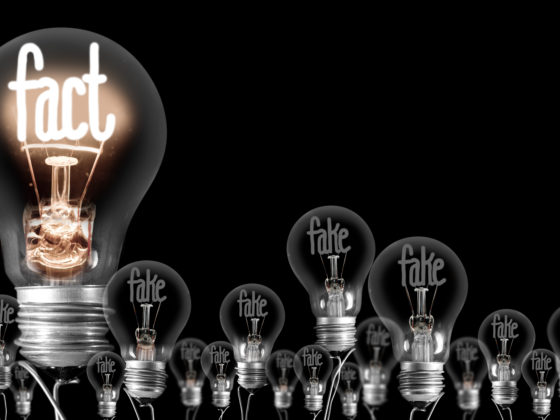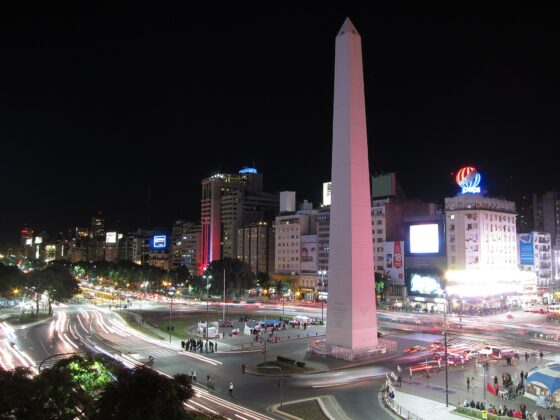This is an extension of the Fact-checking 101 article which you can read here. I would recommend reading that first.
A Case Study in Fact-checking
Someone on my Facebook feed posted something to the effect of this: “Covid is killed by sunlight. So why are they telling us to stay inside?” It went on to imply that it was a sign of some sort of conspiracy to get us to give up our rights. So we’re going to test the statement “Covid is killed by sunlight.”
First step, Google.
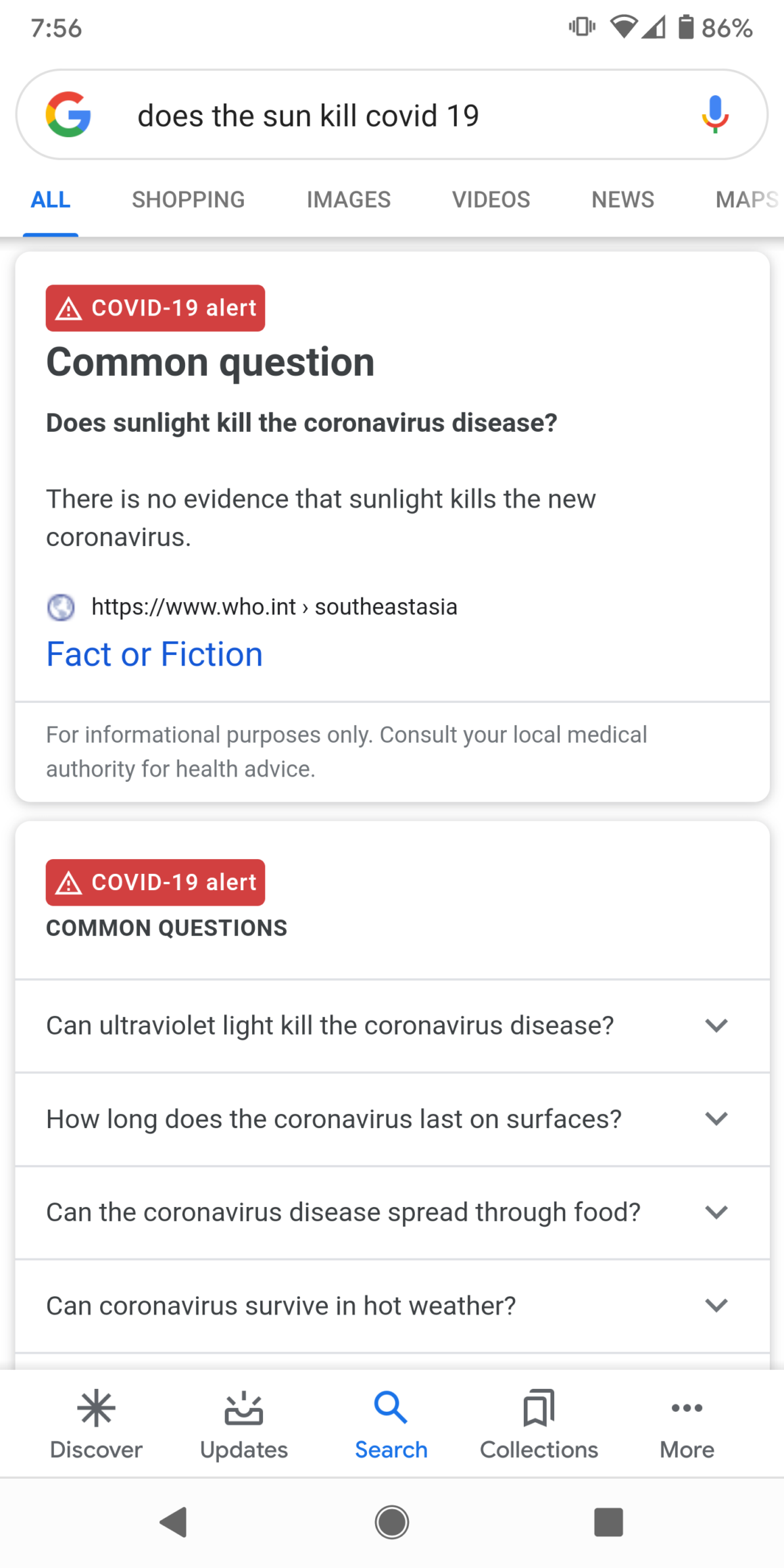
So the World Health Organization says no, there is no evidence that it does. Because this is a developing issue, we probably aren’t going to find peer-reviewed research in an academic journal yet. So we’re going to have to rely upon sources like the WHO and news outlets. When we scroll down:
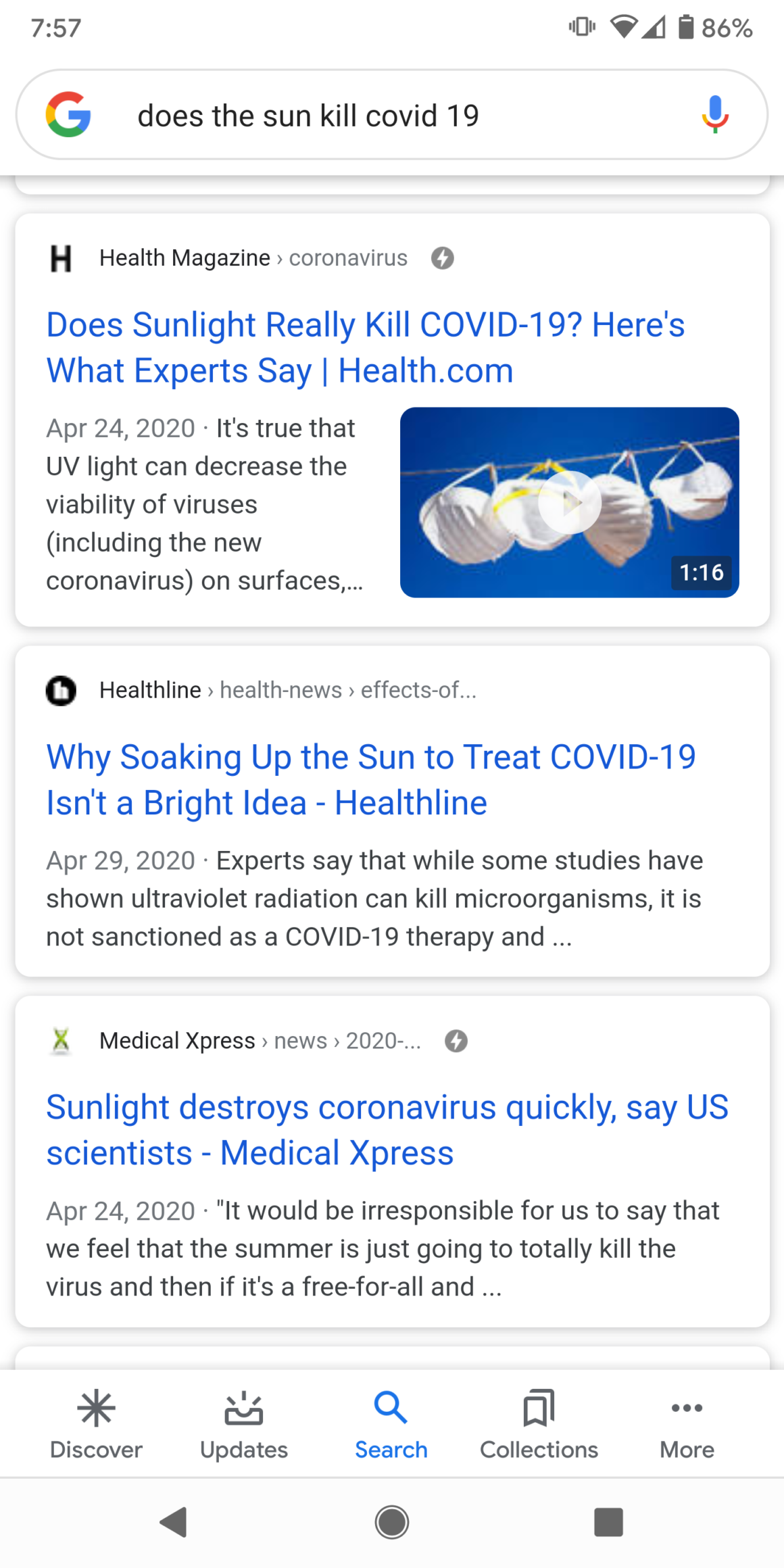
Taking just a cursory look at the headlines, the first source’s headline asks the question, the second seems to say no, and the third seems to say yes. Looks like we have some contradictory evidence, right?
The first entry is Health Magazine. It’s not an infallible source of all light and truth, but it’s a recognizable, reliable source on health issues. It’s also unlikely to be very biased. Here are a couple quotes:
Bill Bryan, the acting homeland security undersecretary for science and technology, said at the briefing: “Our most striking observation to date is the powerful effect that solar light appears to have on killing the virus—both surfaces and in the air. We’ve seen a similar effect with both temperature and humidity as well, where increasing the temperature and humidity or both is generally less favorable to the virus.” …
But we reached out to infectious disease experts to get their take on it—and it turns out there is something to it.
It’s true that UV light can decrease the viability of viruses (including the new coronavirus) on surfaces, but “that doesn’t mean people with COVID-19 who expose themselves to UV light—or sunlight, which contains UV radiation—will get rid of the infection,” infectious disease expert Amesh A. Adalja, MD, senior scholar at the Johns Hopkins Center for Health Security in Maryland, tells Health.
Heathline is the second source:
Hogan said “it has been known for over 100 years” that UV light — whether from the sun or from specially designed light bulbs — can kill microorganisms.
In fact, this kind of light is used to sterilize operating rooms, purify water supplies, and disinfect pharmaceuticals and food items. That being said, it is “not without significant risk to exposed humans.” …
Hogan said the UVC light that Bhutani mentioned is naturally blocked by our atmosphere and ozone layer — it never reaches the planet’s surface.
This kind of light “destroys RNA and DNA more effectively than UVA or UVB, such that the replication of bacteria and viruses, like COVID-19, halts,” she added.
She explained that the amount of UVC that would be needed to accomplish “complete viral eradication is not safe for humans and could result in burns, eye injuries and even skin cancer.”
The third source is Medical Xpress. I’ve not familiar with this site, so first I want to establish its credibility. To do so, I first check out the “about” page on the site. It boasts about how legit it is and how many articles it posts and such, which is all well and good, but I want to see what others say. So I Google “Medical Xpress reviews.” (For the record, even having an about page with information about the organization is a good sign. A lot of bogus sites won’t bother.)

Seems like a resounding endorsement, right? Well, it’s also the exact same phrasing as the site’s about page. So it’s not so much a review site as an aggregator. Not what we’re looking for.
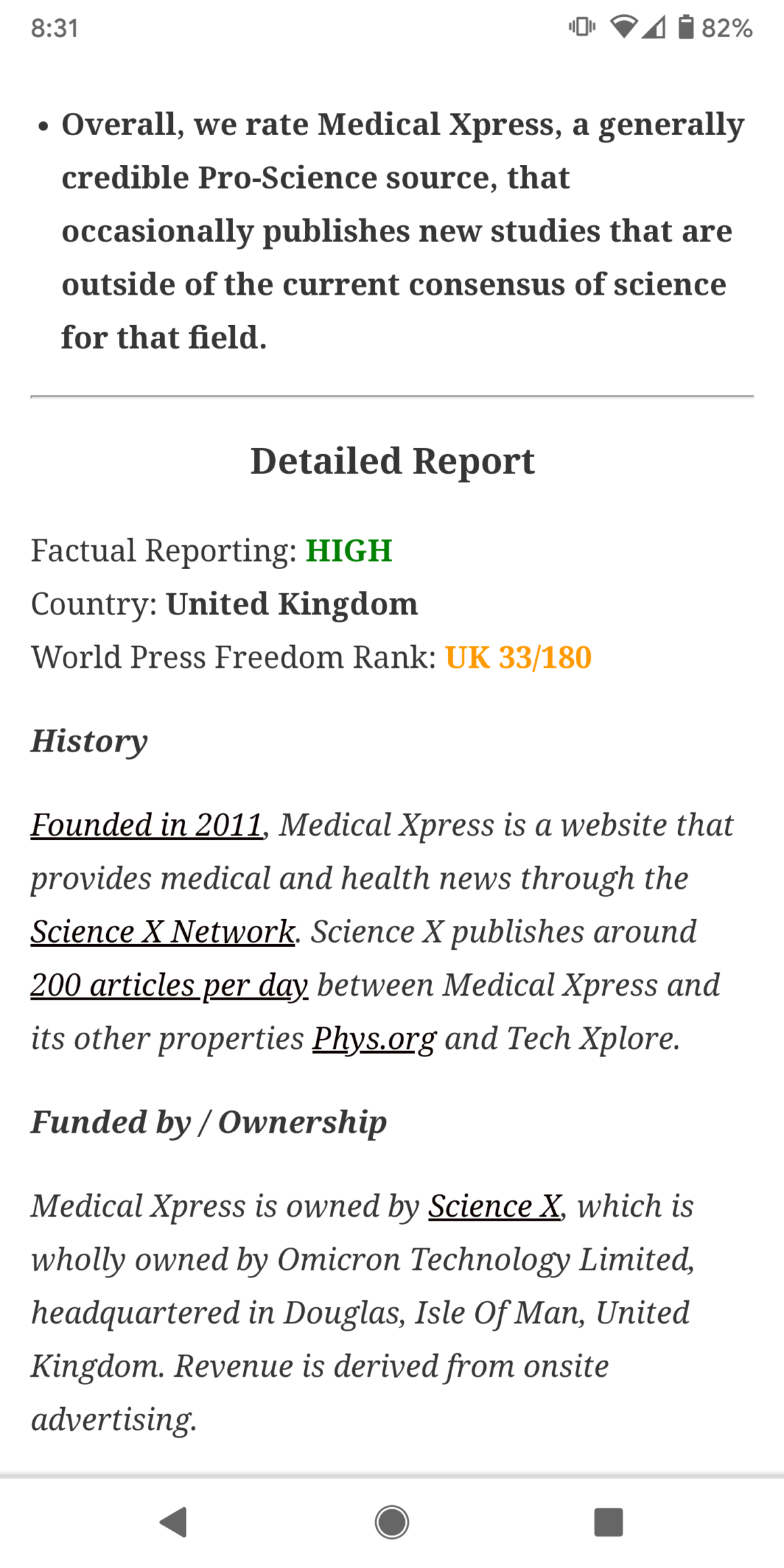
Here is original information that is explicitly reviewing the site and endorsing it, though it does sometimes publish controversial material. I found a couple other sites that similarly say that Medical Xpress is a legit site. So we can at least take it seriously enough to check it out.
So here’s Medical Xpress excerpts:
This includes things like door handles and stainless steel.
But the half-life dropped to six hours when humidity rose to 80 percent—and to just two minutes when sunlight was added to the equation.
When the virus was aerosolized—meaning suspended in the air—the half-life was one hour when the temperature was 70 to 75 degrees with 20 percent humidity.
In the presence of sunlight, this dropped to just one and a half minutes.
Bryan concluded that summer-like conditions “will create an environment (where) transmission can be decreased.”
He added, though, that reduced spread did not mean the pathogen would be eliminated entirely and social distancing guidelines cannot be fully lifted.
“It would be irresponsible for us to say that we feel that the summer is just going to totally kill the virus and then if it’s a free-for-all and that people ignore those guides,” he said.
Here’s the next page of results:
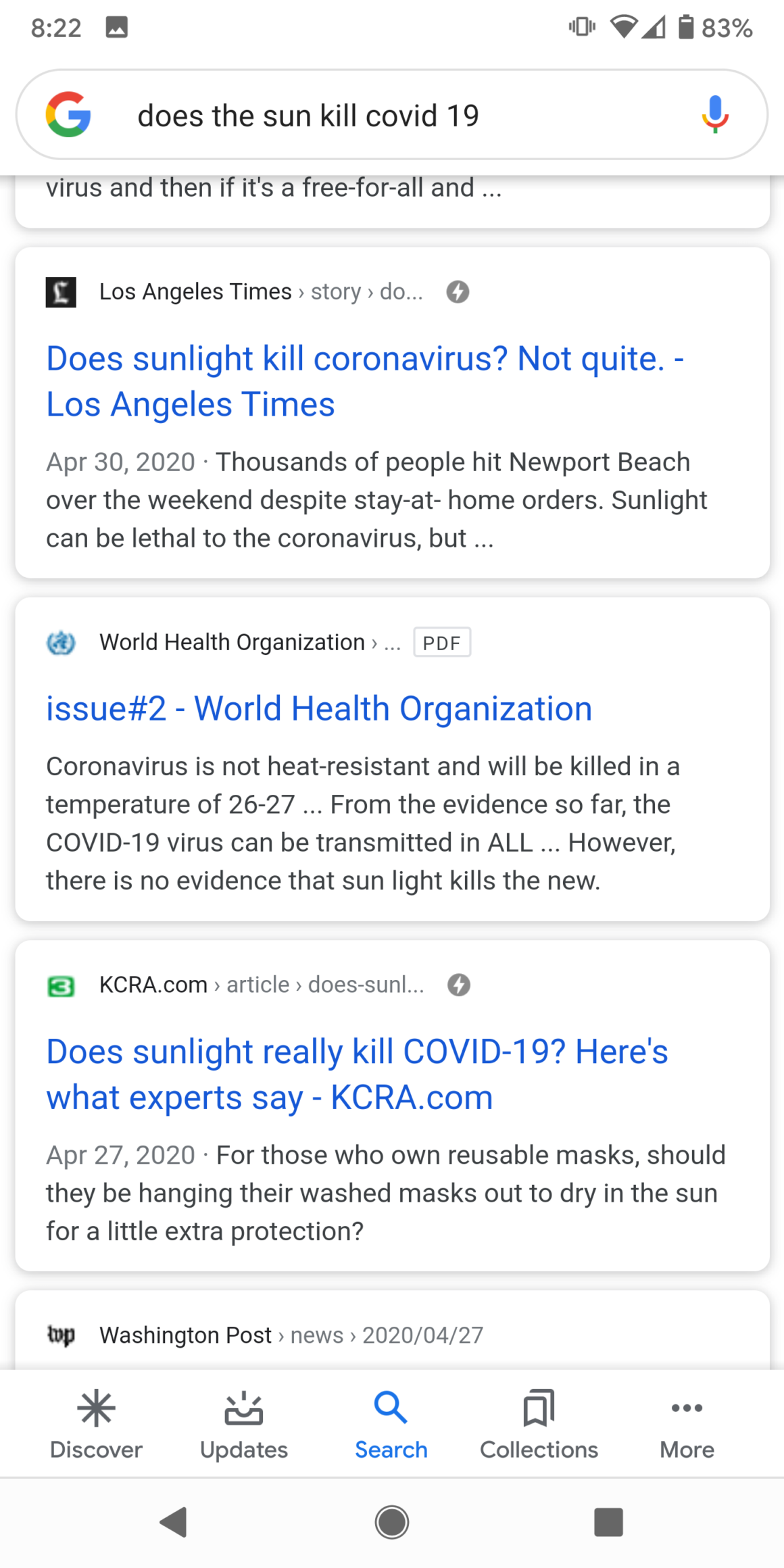
So next up is the LA Times:
“It doesn’t make it safe to go out to the beach because the time it takes for the sun to kill the virus is exceptionally long,” Armani said.
A coronavirus’ outer layer weakens as the temperature rises, Armani said. So when ultraviolet light from the sun heats up surfaces where the virus lands, its survival period will be somewhat shorter. (How much shorter depends on multiple factors, she added.)
But the sun won’t make much difference in spots where shade or clouds reduce the optical intensity of sunlight. Nor will sunshine prevent the virus from spreading from person to person through droplets of saliva or mucus in the air.
Karin Michels, chair of the epidemiology department at UCLA’s Fielding School of Public Health, said there was “no good data” to support the idea that the UV in sunlight would make any difference in the coronavirus infection rate.
Conclusions
Okay, now if you’ve made it this far or just skipped past (that’s fine), it would appear that our fact-checking has yielded a portion of the answer in each of the sources. None of them at the end of the day actually contradict each other – even the ones that seem to have contradictory headlines. It would appear that sunlight does help reduce the life span of virus on surfaces and in the air. That doesn’t mean it’s killed necessarily, and it definitely doesn’t mean that sun treatment for already infected people would be helpful. It also doesn’t mean that parks and beaches and other crowded outdoor areas are safe. There will still be virus hanging in the air if you are near an infected person, it just won’t hang in the air as long as it would inside.
So now we go back to our original post. “Covid is killed by sunlight. So why are they keeping us inside?” This person clearly did not do their due diligence in researching their statement because if they had they would have learned that even though Covid is affected by the sun, social distancing and staying isolated is still prudent. And now they’re encouraging other people to do unsafe things.
What’s even worse, this person then took the next step of building an even more dubious thought on top of the statement that was not thoroughly fact-checked. They tried to use it as proof that we are being manipulated in a nefarious government conspiracy. Then another person sees this person’s post and doesn’t think, “Wait I should see if they’re getting that right.” They think, “Wow, my friend/family member says that a government conspiracy is manipulating us. I need to let my friends and neighbors know too!” And on it goes.

